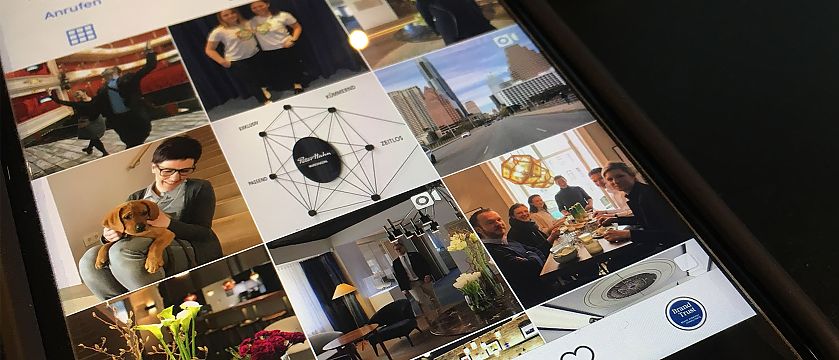Glossary
Scenario Planning
Scenario Planning
Scenario Planning

Scenario planning, also called the scenario technique, is a method companies can use to systematically prepare for possible events that are difficult to imagine in the present. The goal is to find out what the impact of those events might be.
What is the point of scenario planning?
Scenario planning is not about preparing accurate forecasts or projections, but about running through different scenarios that could occur in the future. These scenarios are generated using hypotheses. Along the process, companies also include events they cannot control because they are outside of their sphere of influence.

The goal of scenario planning
The aim is to develop early indicators and prepare concrete measures. This can, for instance, enable a company to prepare market strategies, employee management and the brand in plenty of time to brace for the respective event. If one of the scenarios occurs, the company should then be able to decide and react flexibly, efficiently, and effectively.
Hence, scenario planning has a future-oriented impact. It serves to systematically broaden the imagination of company leadership. It intends to minimize unexpected surprises and promote an understanding of changes and interrelations.
How do you apply scenario planning?
There are two types of scenario planning: the inductive and the deductive.
• Inductive scenario planning focuses on quick, simple, and unsystematic approaches, for example by asking "What if?" questions.
• Deductive scenario planning is based on the systematic and process-oriented 7-step method. This method covers everything from generating relevant scenario questions to scenario sets all the way to the derivation of strategic measures.

Shell demonstrates how scenario planning works
The oil company Shell is an excellent example of how scenario planning can work. The organization showed how to prepare for possible scenarios and react to them efficiently. Thanks to scenario planning, Shell braved the oil crisis during the 1970s better than most of their competitors. With long-term and preventive thinking, Shell was able to establish itself as one of the world's largest oil companies.
Do you have any questions or suggestions regarding this article? Then we look forward to receiving your e-mail.
Semiotics
Semiotics
Semiotics

Semiotics, also called sign theory, is defined as the study of signs, sign systems, languages or codes. The term "semiotics" describes the meaning that results whenever signs are selected and combined. But what are signs? They can be, for instance, images, words, formulas, languages, gestures, and smells. They can influence the behavior of recipients – who do not even have to perceive the signs consciously.
How does semiotics work with brands?
Brands use signs to transmit certain signals – whether intentionally or unintentionally, whether actively managed or not: Perhaps a bouquet of flowers in the lobby, the choice of cookies and drinks in the conference room, the product packaging, their imagery or tonality. Every single brand sends messages.
Regardless of the industry, every brand needs semiotics. However, in order to avoid sending unintended signals that do not fit the brand and its values, companies need to deal with their brands' trademarks at every single brand touchpoint and manage them.
The brand's own code serves as differentiator
How do you use the right signs in brand management? Most brands use codes. Generally, these codes are ways of expression that immediately convey the intended meaning. For instance, there are masculine and feminine codes:
- The feminine code is recognized by soft shapes, pastel colors or tender-sounding product names like "Cashmere Moments" or "Almond Blossom".
- The masculine code uses dark or muted colors, angular shapes and dominant-sounding product names like "Anarchy" or "Apollo".
Brands that use semiotics successfully have a code that is exclusive to them – a code that makes them unique. To develop such a code, a company has to answer the following questions:
- What business are we in?
- What are we really selling?
- What meaning do we want to communicate as a brand?
- What do we as a brand want to stand for?
- Which desires do we satisfy?
Based on the answers to those questions, brand managers can trigger important considerations: What codes can we use to express the specifics of our brand? How is our brand ultimately perceived by consumers?
Service Brands
Service Brands
Service Brands

Classic brand name items have been considered material consumer goods for the longest time. However, since the service sector has become by far the most relevant economic sector, brand management has become much more relevant for service providers to generate increased sales through the brand.
Product brands focus on the material performance, while the customer benefit of a service brand lies in immaterial performances. Service brands are not limited to any sector; they exist for instance in the fields of telecommunications, financial services, tourism, and as online platforms.
The immaterial character is the typical feature of a service – we cannot look at it and touch it. Customers cannot assess its quality in advance, so the purchase risk is higher. For example, booking lodging via the community market place Airbnb is an immaterial service – and it bears a level of uncertainty. This is why experience and recommendation are even more important when it comes to services.
Services are produced and consumed simultaneously in space and/or time. So services cannot be stored, exchanged, or returned. Unlike a product, a service can only be provided when the customer is involved, as in a taxi ride or a visit to the salon.
Another feature of services is the variety of results. This is due for one to the heterogeneity of the services, for another to the variation of performances provided by human beings. For example, a customer consultation at a bank does not always lead to the same result and customer satisfaction.
Our recommendation:
Book: GOOD Business – das Denken der Gewinner von morgen
Single Brand Strategy
Single Brand Strategy
Single Brand Strategy

The two terms one-brand strategy and single-brand strategy are often confused or even used synonymously. But they are different:
Definition one-brand strategy
We talk about a one-brand strategy when a company uses only one brand. This can be – but doesn't necessarily have to be – the corporate brand. One example is innocent Alps GmbH, which concentrates entirely on the brand Innocent and offers a variety of products under that brand.
For a one-brand strategy, brand managers must know the credibility limits of their brand very well to avoid overextending the brand and thereby risking a loss of attractiveness.
A company can thus limit its brand architecture to one brand (one-brand strategy) or offer several brands. We call this a multi-brand strategy.
Definition single-brand strategy
When using a single-brand strategy, a company aims each of its brands exclusively at a particular market segment. Each brand gets its very own "personality", is managed individually and clearly set apart from the company's other brands. In brand lingo these are called mono brands or product brands.
With this strategy, the name of the corporation remains in the background. Examples are the brands Hanuta, Nutella, and Mon Cherie, which are all part of Ferrero. However, the company name is deliberately kept behind the scenes: That way, the company can minimize risks caused for instance by negative press about one of the products. With this brand architecture, Ferrero has managed to take up a lot of space on the store's sweets shelves.
Social Entrepreneurs

So-called social entrepreneurs represent socio-ecological values and want to help bring about change. They deliver peak performances when it comes to finding new solutions for social or ecological problems. Company and business models are built around these ideas.
Even social entrepreneurs think in terms of profit
They are not blue-eyed do-gooders or NGOs, who act without profit-orientation, but they are entrepreneurs to be taken seriously. The goal of social entrepreneurs is to have an impact for the benefit for the world and society – and to make a profit doing it. The latter is, however, seen as a consequence of the positive impact; it is not what drives their actions.
Their self-perception and will to change is currently generating a new league of brands – so-called impact brands.
Learn more here:
Book: „GOOD Business – Das Denken der Gewinner von morgen" by Achim Feige
Social Media Marketing
Social Media Marketing
Social Media Marketing

Social media marketing (SMM) is a form of online marketing that uses social networks like Facebook, Instagram, Twitter, and LinkedIn. Via social media, brands communicate with customers, fans, employees, interested parties and journalists. This makes them approachable.
A central goal of SMM: To offer content that is highly relevant to the users, which they then share within their network. They help the company increase its brand presence, extend its reach, and generate interactions with customers and fans.
What brands need to take into account on the social web
Companies should pursue long-term goals (about 6 months) in the social media, and those goals should correspond to the company goals. These in turn are supported with specific and measurable short-term sub-goals (one week) per channel (perhaps more likes on the Facebook page).
Every brand has to determine for itself which social media channels are most suitable for it. A B2B company, for instance, might use LinkedIn as a lead platform and Instagram, Facebook and Twitter as support platforms.
It is also important that the entire social media communication matches the brand style and the brand core values, so the company remains credible and authentic.
Millennials love "instagrammable moments"
For millennials, Instagram is the most important channel. Self-presentation on Instagram and other social media channels is part of the lifestyle of these digital natives. They are hungry for experiences, and Instagram serves as their platform for eager and intensive research, such as finding background information about brands. This was revealed by our luxury study Digital Luxury: How The Digital Transformation Shapes Luxury Brands.
People from this generation ask about the "why", the purpose of a brand. Social media help them to compare whether the values of a brand match their own values. They then share what they have found with their online community. Incidentally, the competence of the online community is more important to them than the recommendations of a sales person at the point of sale when it comes to purchasing decisions.
For tourism and destinations it is crucial to offer "instagrammable moments". British millennials, when asked how they decide on a vacation destination, answered most frequently (over 40 %): "How well you can show the destination on Instagram.". One example is the Hotel Riad BE Marrakech, which has 8,000 profile visits per week and 300 homepage visits per day; 50 % of booking requests come in via Instagram.
Follow us on social media: LinkedIn, Facebook, Instagram, Twitter, Xing and YouTube.
Sports Brands
Sports Brands
Sports Brands

Sports Brands are brands that provide specific and corporate peak performances in the sports sector and express them in condensed form.
The current market leader is the American brand Nike, which created the world's largest jogging community with Nike+, and equipped Michael Jordan even before he became a basketball icon and developed the Air-Jordan collection with Nike. Nike's eternal pursuer is adidas, who also delivered outstanding peak performances in the sports sector, such as the development of cleated soccer shoes by founder Adolf Dassler. These shoes are considered the reason for the German national soccer team's first world championship title in 1954.
In addition to other sports brands like Puma and Reebok, which have been taken over by adidas, we must mention Under Armour. The enterprise founded by Kevin Plank is a newcomer in the industry and has pushed Puma out of third place on the list of the largest sporting goods suppliers, even though the company was only founded in the 90s.
The reason the company deserves attention and the secret to its success is the niche in which it started. Founder Plank recognized that the high rate of sweat absorption of sporting apparel reduces athletes' performance. This inspired him to start his brand.
Starbrands and Superstar-Brands
Starbrands and Superstar-Brands
Starbrands and Superstar-Brands

Not every strong brand is a star. And not every star brand remains one.
How does a brand become a star brand?
In brand strategy, we talk about star brands when a brand fulfills two conditions: it has high awareness and distribution as well as high attractiveness. The latter is not measured by image values, but by people's behavior: above-average loyalty, willingness to pay, recommendations, and cross-selling.
The position of a star brand is not permanent – it is a feat of strength. Market dynamics, shifts in expectations, and competitive pressure contribute to many brands achieving this star status only temporarily – and often losing it faster than they built it up. The majority of brands oscillate between success and loss of relevance.

We determine the awareness and appeal of brands using the BrandTrust Performance Monitor.
What characterizes a superstar brand?
However, there is a step up from star brands: superstar brands. These are brands that remain at the top of their game – not despite change, but because of it. They don't constantly reinvent themselves, but they always do so at the right time. They solve the "innovator's dilemma" not academically, but operationally. Over the years, they succeed in making their mark on the market – even imposing their mark on the market.
Superstar brands grow faster than their competitors. They are more resilient in crises and repeatedly break industry rules that others consider immutable. They do not define their market – they redefine its boundaries.
Some examples of superstar brands:
- Technology: Apple, Adobe, SAP
- Automotive: Porsche, Toyota (Lexus), Ferrari
- FMCG/food: Coca-Cola, Mutti, Red Bull
- Fashion / Luxury: Chanel, Hermès, Rolex
- Education/media: Harvard, New York Times, The Economist
- Platforms/services: Airbnb, Amazon, Netflix (with restrictions)
- Banking: American Express, Goldman Sachs, J. P. Morgan
Storytelling
Storytelling
Storytelling

The term storytelling has become established in the management world – in particular in brand management, marketing, sales, and change management. Storytelling describes the strategic use of stories to evoke an emotional response in listeners in order to impress or persuade them.
Storytelling is especially suited to convey facts and historic events about a product or a brand in unusual ways. Such content is remembered longer and more intensely. This proven effect of storytelling is based in the different ways the two halves of our brains function: While the left brain is responsible for analytical, linear processes, the right brain is in charge of creative and emotional decisions. By connecting facts with stories, both brain halves are engaged and the content is engrained for longer and more permanently.
The result of storytelling is heightened attention in the listener. It boosts the persuasiveness of the brand and leads to identification and trust in the product and the brand.
A story should satisfy these requirements:
- As simple as possible
- Authentic
- Credible
- Attractive to the listener
- Emotional
- Adaptable to different situations and listeners
- The brand or the product and its benefit to the listener should be the focus.
The following types of stories are conceivable:
- Historical: Reference to history, for example founding, invention of the core product, or challenges successfully mastered. Examples would be the invention of the automobile by Carl Benz, or the Bentley Boys of the Bentley brand, who won a number of races with the brand during the 1920s, or the founding of HP in an American garage.
- Mythical: Often product-related myths that surround a product, such as the secret formula for Coca-Cola.
- Experience-based: These are true stories told by customers about the brand or the product. They are sent via social media to the companies, who can then use them for strategic storytelling.
One very famous storyteller is Steve Jobs, who started one of his best-known talks at Stanford University with the sentence. "Today I want to tell you three stories of my life", Martin Luther King Jr. with his "I have a Dream" speech, or Warren Buffet, of whom this quote claims: "He takes the cold hard facts of his investment strategies, wraps them in his honest emotion, and the resulting story has transformed Berkshire Hathaway into an unstoppable money-making machine."
Our recommendation:
Article: Machen Sie sich unvergleichbar – mit Storytelling
Article: Die Macht der Geschichten – das Rezept erfolgreicher Kosmetikmarken wie La Mer
Strong Brands
Strong Brands
Strong Brands

A brand is strong when it condenses the peak performances of a company and makes them tangible over a long period of time, and credibly presents its uniqueness at all brand touchpoints. For instance, BMW conveys "Joy (of Driving)" in every interaction – whether in the car itself, on the web site, or in the company's own BMW museum.
Strong brands have clear brand core values, an unequivocal positioning, and a long-term brand strategy. Consistent brand management with the help of brand rules ensures that the brand strategy is consistently applied in operative business. This helps to prevent a brand from overstepping its credibility limits.
A brand strategy always has a content component and a style component that both have to be implemented so that the brand can always be clearly recognized by its brand messages and its brand style. In short: Strong brands give consumers a clear image of the brand and what it stands for.
Strong brands are therefore desirable and highly attractive. This has diverse positive effects on corporate success:
- The customer's price sensitivity is substantially lower, so the brand strength is reflected in profitability and profit margin.
- They attract the right employees and ensure that the company has an excellent position in the crucial fight for the best talent.
- They are beacons for all relevant decisions. In ever more complex market environments, they provide logical orientation.
A strong brand always has an impact internally as well as externally. It is not only the foundation for success in marketing and communication – rather, it is often a powerful and enthusiastic leadership and management instrument, which provides a clear action framework with defined brand limits, both internally and externally.
Thus, a strong brand is always a support pillar for the company's business success.
Our recommendation:
Article: The brand as a business management imperative – What it contributes to the success of the enterprise
Article: Without a strong employer brand, companies have no future
Article: Mainstream makes brands interchangeable – the problem of "Middle Brands"
Sub-brand
Sub-brand
Sub-brand

A sub-brand is generally classed under an umbrella brand or family brands. It uses certain elements of the overarching brand. For instance, Nivea Sun and Nivea Men are sub-brands of the family brand Nivea.
When are sub-brands advantageous?
Benefits of a sub-brand: For one, it can be specifically positioned. Also, by using several sub-brands within and umbrella or family brand, individual product categories can be clearly distinguished from one another. This gives consumers orientation. At the same time, a sub-brand can profit from the brand strength of the common umbrella or family brand. The example of Nivea illustrates how important this connection is.
Disadvantages of a sub-brand: An image problem of a sub-brand could affect the umbrella or family brand – including all other sub-brands. Such impact is all the more severe the more visible the connection between sub-brand and overarching brand is. Another disadvantage is the relatively high coordination effort that is required.
The challenge for brand management: It must position the overarching brand clearly and find a balance between the commonalities of the sub-brands – for instance their shared brand core values – and their simultaneous clear differentiation.
See also: Definition product brand
Successful Brands
Successful Brands
Successful Brands

Successful brands leave nothing to chance: They steer their success very deliberately, know their DNA and their fans. They step back from things they cannot do and communicate these insights outwardly as their brand positioning. They control their operative business with brand rules that make sure the company's actions are brand-centered.
A successful brand has a specific character that has grown over the course of many years out of the brand's peak performances. It is formed from the inside out, which means: It is continually "recharged" with peak performances, like a battery, which then transports that brand energy outward to the customer.
A classic trait of a successful brand: It gathers a community of fans who are attracted by its values. Its managers have identified the motives why their fans became fans, and know how to generate more fans.
A successful brand is positioned credibly, in accordance with its character. It is attractive (so it draws fans) and at the same time differentiating (from the competition). It has defined strategic ways to reach that positioning and acts according to those principles.
In short: All of these elements make up the strategic foundation for building a successful brand. The corresponding brand strategy is ultimately conveyed at all brand touchpoints. This is where a unified brand experience is created for the customer. If a brand wants to achieve lasting success, it must continuously recharge its battery and prove itself at the brand touchpoints in order to create a consistent image in people's minds. It is the only way to generate long-term orientation and trust.
Our recommendation:
Book: No. 1 Brands – Die Erfolgsgeheimnisse starker Marken
Study: What is important to B2B customers in making purchasing decisions?
Sustainability for Brands
Sustainability for Brands
Sustainability for Brands

A brand can benefit greatly—both in terms of its reputation, as well as financially—when a company decides to make a commitment to sustainability. However, such commitment has to be practiced out of a deep conviction and be communicated honestly. Another thing that is often forgotten: It has to fit the brand.
Why does sustainability pay off for brands?
People these days are highly aware of social deficiencies and global challenges. They don't want to be part of the problem but part of the solution. But: Quite often, their actions don't reflect this noble attitude.
That is why people like to delegate that responsibility to brands, and are also willing to pay more for them. They want to act responsibly and contribute to a better world by buying the brand. Brands that tackle sustainability problems are highly attractive to them—but only if buying the brand does not feel like they are missing out on something or getting a lesser alternative.
With this "deal" between consumers and brands, companies overcome the (ostensible) chasm between the will to do good and their profitability.
So-called impact brands show the kind of attraction that can develop:
- Tony's Chocolonely with their impact mission "together we make chocolate 100% slavery-free"—founded in 2005—is now the market leader in their home country, the Netherlands.
- The brand Patagonia was able to triple its sales over a six-year period, while other providers of outdoor clothing had stagnating sales figures.
Does sustainability always mean "ecological"?
No. Of course brands should take measures to counteract climate change. But for the sake of their credibility, brands should examine three different aspects: They should assess their ecological, social and economic commitment.
If sustainability is considered in its entirety—not reduced to its ecological component—it represents a broad action and positioning framework for brands.
Brands should decide on a strong focus, perhaps the social aspect. This generates positive preconceptions—which in turn rub off on the other two dimensions of sustainability. Such a focus by no means precludes measures in the other areas: They are just not placed center field but add to the company's credibility from the sidelines.
Two levels should be considered:
- Performance level: If a company is particularly active in one of the three areas, it can raise this commitment to the performance level. But this is not absolutely necessary.
- Perception level: The commitment must fit the brand credibly, be attractive to consumers, and demonstrate how the brand is different from the competition.
The differentiation from the competition is particularly important if the brand is to be positioned with its sustainable actions.
How can I associate sustainability with my brand?
The decision about which path a brand should take must be carefully considered. A company must strategically weigh the options and decide how the interplay of brand and sustainability should work. Based on that, a corresponding communications strategy is created.
Which strategy should be followed? There are three directions:
The brand becomes a CSR brand: The positioning is maintained because, ideally, it is well established with customers. Sustainability is coherently and credibly associated with the brand as a logical connection with the DNA of the brand is established. Every sustainable measure then references this connection.
Volvo says, for instance (we paraphrase): We have always focused on the safety of people, within and outside of our cars. That includes an intact environment and a healthy society. This is why we work on sustainable solutions – social, ecological and economic ones.
The brand becomes a Good Brand: The brand is positioned directly with the sustainability argument. That means: Sustainability must be associated with the brand at the first level of perception. It becomes the decisive buying criterion. It must be ensured that sustainability measures are integrated in all company units and along the entire value chain. Every product must show this attitude.
A successful example is the brand Vaude: They try to act sustainably in everything they do.
The brand becomes an impact brand: The brand is very sharply positioned on remedying a concrete problem or global challenge. That is its impact mission. To achieve this, a profitable business model must be developed. The brand affects changes in the behavior of its stakeholders with its activities.
The brand Patagonia is a representative of this species of brand. It says (we paraphrase): We are in business to save our home planet. Which means nothing less than doing everything we possibly can against climate change.
Patagonia is politically active, fights for (new) nature preserves, and encourages its customers to join local activist groups. In addition, the brand Patagonia shares its knowledge and experience with activist groups so they can increase their effect and efficiency.
Does sustainability follow the motto "a lot goes a long way"?
This is a fallacy often encountered in companies with conventional brands. Many think: "We just have to communicate our sustainability strategy more forcefully—we're doing enough already."
But when it comes to sustainability, the same principle applies: "A lot of performances do not make a strong brand". What counts is a clear focus.
Overdoing it with the measures can even backfire: Consumers become skeptical—and shove the brand into the #Greenwashing drawer. Such problems arise when there is no vision for a brand's sustainability commitment. Brands need a clear focus they can work toward consistently. That's what makes them strong.
How can brands communicate their sustainability commitment?
There is only one way to do this: your way. For a company to design the best possible communication strategy, these questions have to be answered first:
1. Status quo: How sustainable do consumers think the brand is currently? Is its sustainability commitment already contributing to the company's credibility? Please note: A brand loses its credibility if it has never been noticed for its commitment to sustainability and then suddenly, out of nowhere, tries to position itself as "the most sustainable / one of the most sustainable".
2. Context: At what level is the issue of sustainability important to consumers? Is it a purchase-relevant performance criterion? Or would it be better placed at the second level of perception, credibly and consistent with the positioning? Family businesses, for example, should ask themselves if consumers already consider them to act sustainably. If that's the case, it might not make sense to elevate the topic prominently to the first level.
3. Long-term significance: What is the company's intention? What significance should sustainability have for the brand in the long term? Sustainability is not a topic for a quick buzz.
How can an established brand act sustainably and be credible about it?
These five points need to be taken into account to keep brands from winding up in the greenwashing drawer with their ambitions:
- Clear Ambition: There must be clarity about what role sustainability should play in the business model and the business practices. Based on this, a decision must be made what the role of sustainability will be for the brand positioning.
- Culture First: The claim of acting sustainability has to take root internally first—credibly and with a clear goal. That way it can be integrated into tasks, processes and cooperation. All this has to happen before anything is communicated outward.
- Actions Before Words: To achieve the vision, a company has to focus on consistent action, not on individual communication measures like creative campaigns. One indicator of proper emphasis is the distribution of the budget: Are 80% of the budget going to sustainability measures and 20% into communication (which makes sense)? Or is it the other way round?
- Talk The Walk: If a brand is far removed from sustainability and people do not associate it with it, measures can still be taken—out of conviction and without communicating them directly and prominently. However, if the perception of the brand is supposed to change, the only way to do that is through honest communication. Customers and the public must be involved in the journey to more sustainability. A company should not suddenly claim that everything has always been perfect.
- Referencing: It is crucial to create a feeling of integrity—through a focus that fits the brand. All measures that are communicated need to have that focus. That means: A company should not communicate a whole plethora of measures, but only those that fit the focus.
Must a sustainable brand always take a stand, on all social issues?
Brands should only declare their opinions on topics on which they will take concrete action or have already done so. Such past measures should be communicated along with future ones in this context.
Movements like "Me too" or "Black lives matter" for example should not be seen as just a welcome opportunity to communicate, but above all as an occasion to check one's business activities in general, including personnel policies and choice of partners and suppliers.
If a brand stays merely on the level of appeals and campaigns, this can easily work against it. Take for example the German national soccer team 2021: Their human rights activism during the game against Iceland instantly lost credibility as a making-of high gloss video that revealed superficial goals.
Brands must avoid being accused of woke washing and losing credibility. The term woke washing is applied when an organization or person claims or does something to signal commitment to a social cause—but in reality does nothing about it or even supports the opposite.
What is the difference between purpose and sustainability?
The purpose of a company describes what drives that company beyond striving for profit. It is about the goals and objectives the company pursues aside from making money. It is the company's reason for being, so to speak.
Brands should know what drives them apart from purely seeking profits. This clarity provides the energy for identification and innovation. And it provides the necessary flexibility in case of unforeseeable changes.
A purpose is helpful when it is difficult to present a company on the sustainability platform. While sustainability is often reduced to its ecological dimension, a purpose can be very diverse (but can certainly have sustainable goals).
What drives a brand, apart from earning money—does not necessarily have to be a purpose. Depending on the brand character and the current industry situation, companies should decide whether a purpose, moonshot, mission and vision, or just a positioning beyond rational benefit can do the job.
Every brand should ask itself which aspect of its brand strategy represents the most sensible interface with sustainability.
Learn more:
Article: How to implement your sustainability strategy in-house - 5 tips
Do you have any questions or suggestions regarding this article? Then we look forward to receiving your e-mail.
Get in touch with us
Would you like to arrange a non-binding telephone call with us or do you have questions about our offer? Then simply fill out this form and we will get in touch with you as soon as possible.

Social Entrepreneurs
Social Entrepreneurs